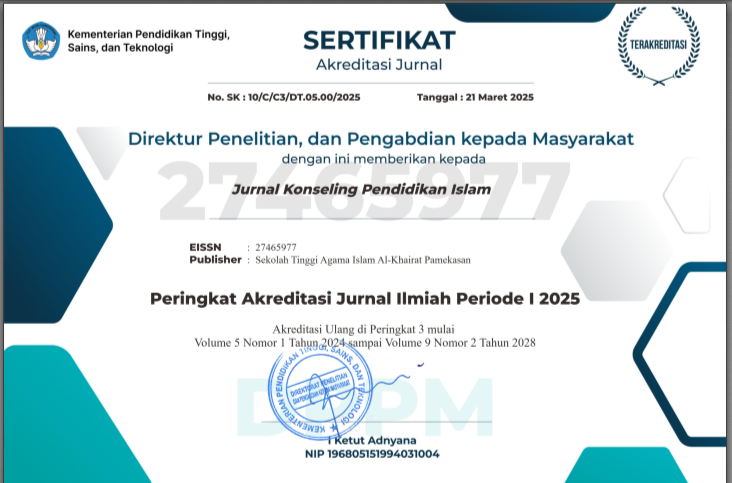ISUE KEPERCAYAAN DALAM KAJIAN KESEHATAN MENTAL
DOI:
https://doi.org/10.32806/jkpi.v3i2.20Keywords:
attachment, trust, mental healthAbstract
Kepercayaan menjadi komponen penting dalam membentuk dan mempertahankan suatu hubungan interpersonal. Begitu pula kepercayaan diri adalah salah satu sifat baik yang harus dimiliki individu. Sifat penting yang membentuk kepercayaan dasar adalah perasaan akan kebaikan esensial seseorang dan perasaan mencintai diri. Tujuan penelitian adalah menganalisis isu kepercayaan dalam kajian kesehatan mental. Metode penelitian dilakukan secara kualitatif, yakni melalui berbagai kajian pustaka yang diperoleh dari ebook maupun artikel jurnal bereputasi yang relevan. Analisis data dilakukan menggunakan teknik tematik. Hasil penelitian mengacu dari beberapa temuan empiris, di mana pengalaman kelekatan membentuk kepercayaan, atau sebaliknya sikap kewaspadaan pada orang lain. Perasaan aman yang diperoleh dari pengalaman kelekatan berhubungan negatif dengan permasalahan eksternal maupun internal, serta hasil akademik yang merugikan. Implikasi penelitian mengarah pada pentingnya kesesuaian antara informasi, kognisi dan afeksi sebelum memberikan kepercayaan pada orang lain.
References
Ardizzi, M., Martini, F., Umilta, M.A., Evangelista, V., Ravera, R., & Gallese, V. 2015. Impact of childhood maltreatment on the recognition of facial expressions of emotions. PLoS One, 10, e0141732.
Arnberg, F. K., Eriksson, N. G., Hultman, C. M., and Lundin, T. 2011. Traumatic bereavement, acute dissociation, and posttraumatic stress: 14 years after the MS Estonia disaster. J. Trauma. Stress 24, 183–190. doi: 10.1002/jts.20629
Balliet, D., & Van Lange, P. A. M. 2013. Trust, conflict, and cooperation: A meta-analysis. Psychological Bulletin, 139, 1090–1112.
Betts, L. R., & Elde, T. J. 2011. The Role of Social Identity Threat in Determining Intergroup Trust. In Bernadette R. Curtis (Ed.), Psychology of Emotions, Motivations and Actions: Psychology of Trust. Nova Science Publishers, Inc.
Boe, H. J., Holgersen, K. H., and Holen, A. 2011. “Mental health outcomes and predictors of chronic disorders after the North Sea oil rig disaster: 27-year longitudinal follow-up study. J. Nerv. Ment. Dis. 199, 49–54. doi: 10.1097/NMD. 0b013e31820446a8
Bosmans, G., & Kerns, K. A. 2015. Progress and Prospects Attachment in Middle Childhood: Progress and Prospects. 148. https://onlinelibrary.wiley.com/doi/abs/10.1002/cad.20100
Bowlby, J. 1980. Loss: Sadness & Depression. Attachment and Loss (Vol. 3). London: Hogarth.
Brewin, C. R., and Holmes, E. A. 2003. Psychological theories of posttraumatic stress disorder. Clin. Psychol. Rev. 23, 339–376. doi: 10.1016/S0272-7358(03) 00033-3
Chan, D.K.C., Hamamura, T., Li, L.M.W., & Zhang, X. 2017. Effect of human development on the relationship between generalised trust and health: an international cross_sectional investigation. The Lancet, 390, S105.
Cogsdill, E.J., Todorov, A.T., Spelke, E.S., & Banaji, M.R. 2014. Inferring character from faces: A developmental study. Psychological Science, 25, 1132–1139.
Erikson, E. H. 1963. Childhood and society (2nd ed.). New York: Norton
Fonagy, P., & Allison, E. 2014. The role of mentalizing and epistemic trust in the therapeutic relationship. Psychotherapy, 51(3), 372.
Gunnar, M.R., & Reid, B.M. 2019. Early Deprivation Revis_ited: Contemporary studies of the impact on young children of institutional care. Annual Review of Developmental Psychology, 1, 93–118
Jones, H. S., & Moncur, W. 2018. The role of psychology in understanding online trust. Psychological and Behavioral Examinations in Cyber Security, 109–132. https://doi.org/10.4018/978-1-5225-4053-3.ch007
Nanni, M. G., Caruso, R., Sabato, S., and Grassi, L. 2018. Demoralization and embitterment. Psychol. Trauma 10, 14–21. doi: 10.1037/tra0000326
Neil, L., Viding, E., Armbruster-Genc, D., Lisi, M., Mareschal, I., Rankin, G., Sharp, M., Phillips, H., Rapley, J., Martin, P., & McCrory, E. 2022. Trust and childhood maltreatment: evidence of bias in appraisal of unfamiliar faces. Journal of Child Psychology and Psychiatry and Allied Disciplines, 63(6), 655–662. https://doi.org/10.1111/jcpp.13503
Pollak, S.D. 2003. Experience-dependent affective learning and risk for psychopathology in children. Annals of the New York Academy of Sciences, 1008, 102–111.
Prada, S. I., Takeuchi, Y., Merchán-Galvis, A. M., & Ariza-Araújo, Y. 2017. Actual ex_pense associated with patients with Alzheimer's disease in Colombia. International Psychogeriatrics, 29(11), 1835–1840.
Rotenberg, K. J. 2018. The Psychology of Trust. Routledge.
Shtompka, P. 2012. Trust is the foundation of society. Moscow: Logos.
Tambelli, R., Laghi, F., Odorisio, F., & Notari, V. 2012. Attachment relationships and Internalizing and Externalizing problems among Italian adolescents. Children and Youth Services Review, 34(8), 1465–1471. https://doi.org/10.1016/j.childyouth.2012.04.004
Thoresen, S., Birkeland, M. S., Wentzel-Larsen, T., & Blix, I. 2018. Loss of trust may never heal. institutional trust in disaster victims in a long-term perspective: Associations with social support and mental health. Frontiers in Psychology, 9(JUL), 1–10. https://doi.org/10.3389/fpsyg.2018.01204
VanHarmelen, A.-L., Gibson, J.L., St Clair, M.C., Owens, M., Brodbeck, J., Dunn, V., & Goodyer, I.M. 2016. Friendships and family support reduce subsequent depressive symptoms in at-risk adolescents. PLoS One, 11, e0153715
Downloads
Published
How to Cite
Issue
Section
License
Copyright (c) 2023 Moesarofah Moesarofah

This work is licensed under a Creative Commons Attribution 4.0 International License.








